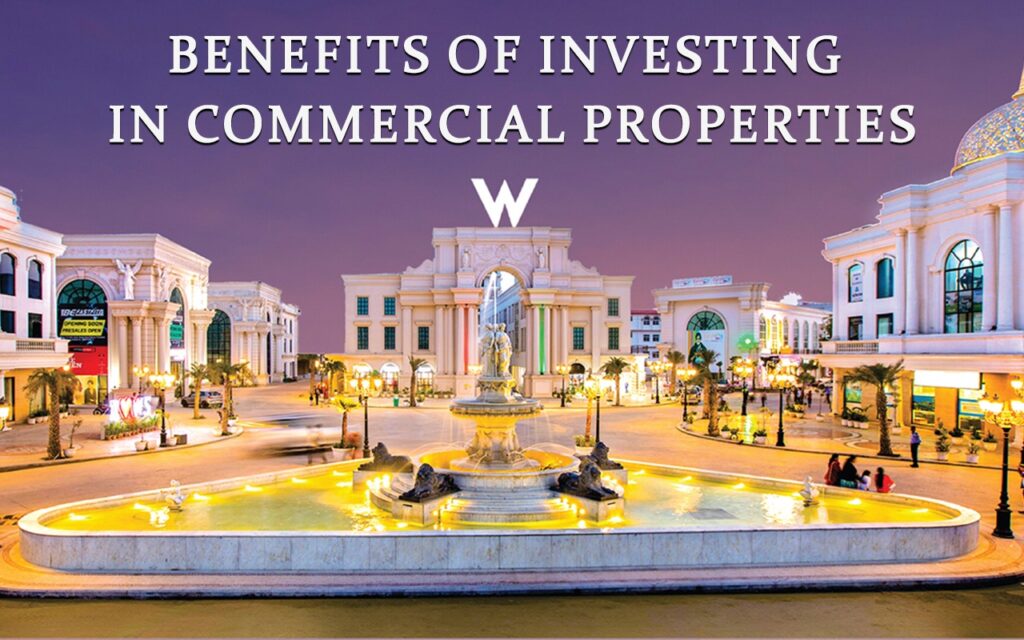Benefits of Investing in Commercial Properties
The real estate industry is ever-evolving, and one area that continues to generate strong investor interest is commercial property. Whether you’re a seasoned investor or a newcomer to the real estate market, understanding the benefits of investing in commercial properties can open up new opportunities for long-term wealth creation.
In this blog post, we’ll explore why commercial real estate (CRE) is considered a smarter and more profitable investment, particularly in 2025, and how it compares to other property types. If you’re looking to grow your portfolio or generate stable income, this guide will help you make an informed decision.

What is Commercial Property?
One of the most significant benefits of investing in commercial properties is high rental income. Commercial spaces often yield 6% to 12% annually, while residential properties may only bring in 2% to 4%.
Why does this happen?
Longer lease terms
Higher rental agreements
Steady cash flow from businesses
Shared expenses (tenants may pay for maintenance, taxes, and utilities)
1. Higher Rental Yields Compared to Residential Properties
One of the most significant benefits of investing in commercial properties is high rental income. Commercial spaces often yield 6% to 12% annually, while residential properties may only bring in 2% to 4%.
Why does this happen?
Longer lease terms
Higher rental agreements
Steady cash flow from businesses
Shared expenses (tenants may pay for maintenance, taxes, and utilities)
2. Long-Term Lease Agreements
Unlike residential tenants who typically sign 11-month rental contracts, commercial tenants prefer multi-year leases, often ranging from 3 to 9 years or more.
Predictable cash flow
Lower vacancy risk
Stability in income
Easier financial planning
This stability makes CRE a preferred option for investors aiming for passive income and long-term growth.
3. Professional and Reliable Tenants
Commercial properties attract business tenants who are more reliable than residential renters. These could include:
Retail brands
Banks
Restaurants
Corporate offices
Startups and coworking spaces
4. Value Appreciation Over Time
Commercial property values tend to appreciate steadily over time, especially if located in high-growth areas or near infrastructure projects (like metro lines, expressways, business parks, or airports).
Factors that contribute to appreciation:
Increase in foot traffic
Demand from businesses
Area development plans
Government smart city initiatives
In growing cities like Faridabad, Noida, and Gurugram, commercial hubs are booming, making this the right time to invest.
5. Diversified Investment Portfolio
Adding commercial real estate to your portfolio helps in diversifying investment risk. Most investors rely on mutual funds, FDs, or residential properties. Commercial assets offer:
Tangible value
Hedge against inflation
A separate asset class that performs well even when markets fluctuate
Diversification ensures that your overall portfolio remains strong, even during economic uncertainty.
6. Passive Income Generation
For investors seeking financial freedom, commercial property offers one of the most reliable passive income sources. With longer leases, professional tenants, and minimal involvement, it becomes easy to earn income without daily management.
You can even partner with property management companies to take care of leasing, maintenance, and documentation, making it a true “hands-off” investment.
7. Tax Benefits
Commercial property investments are eligible for various tax deductions that can help reduce your overall tax burden:
Depreciation benefits
Interest on loans
Property taxes
Maintenance expenses
If structured wisely, commercial property can lead to significant tax savings, especially for high-net-worth individuals or companies.
Things to Keep in Mind Before Investing
While the benefits are many, successful commercial real estate investment requires proper planning. Here are a few tips:
Location is key: Choose high-growth zones with business demand.
Developer reputation: Invest with credible names like Omaxe, DLF, M3M, etc.
Lease terms: Ensure favorable terms with escalation clauses.
Legal checks: Ensure RERA compliance and property title clarity.
Budgeting: Consider maintenance, taxes, and downtime before calculating ROI.
Conclusion: Is Commercial Real Estate Right for You?
If you’re looking for steady income, long-term value, and a strong hedge against inflation, commercial real estate is one of the best investment avenues available in 2025.
With benefits like higher returns, stable tenants, tax advantages, and consistent demand, it’s clear why more investors are turning toward this segment.
